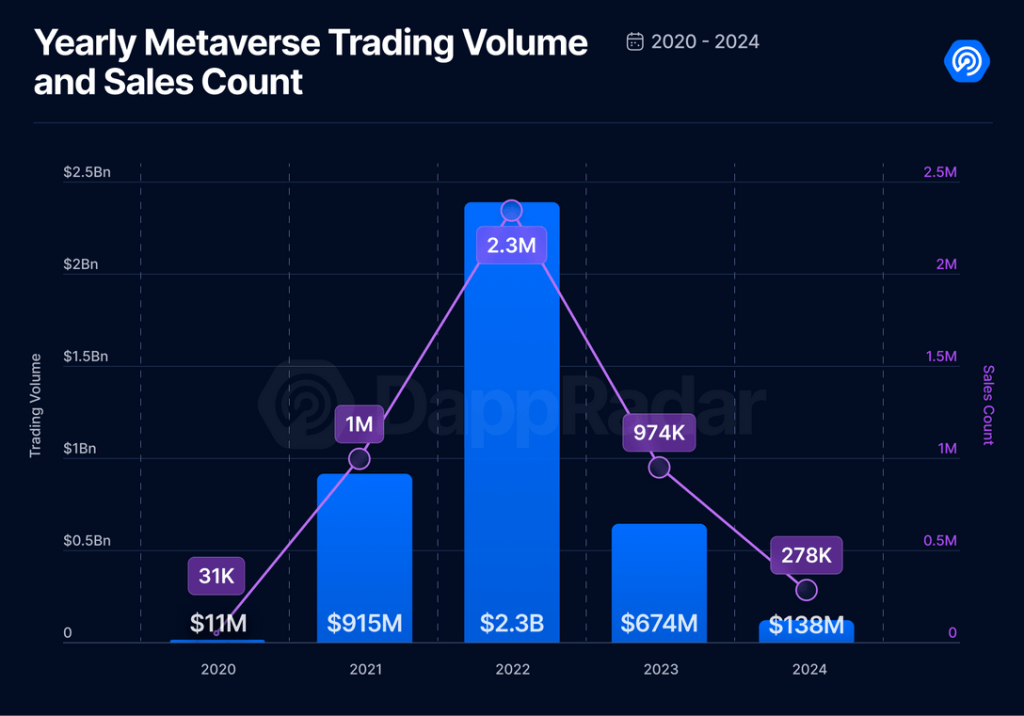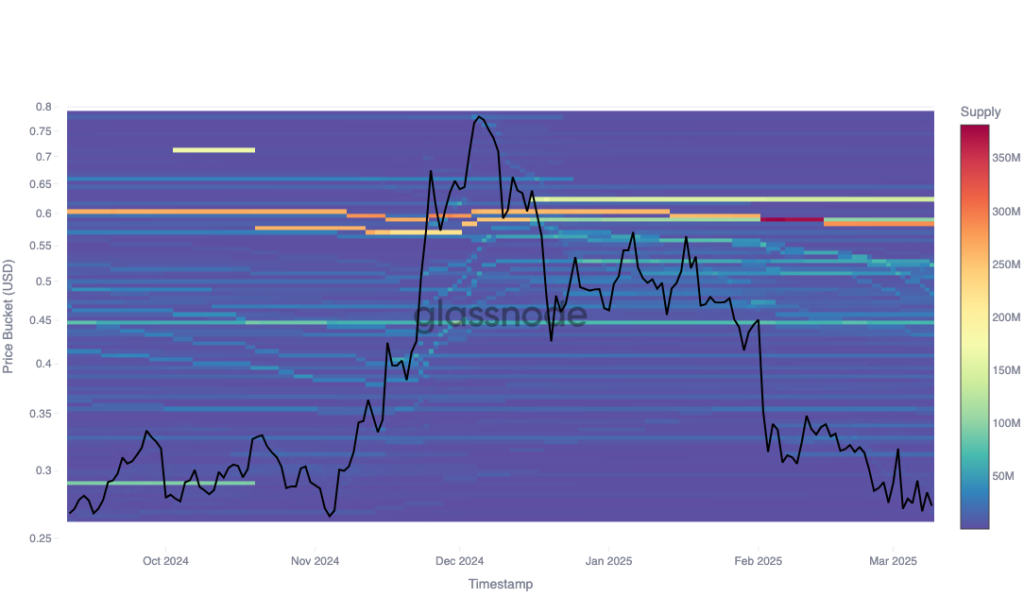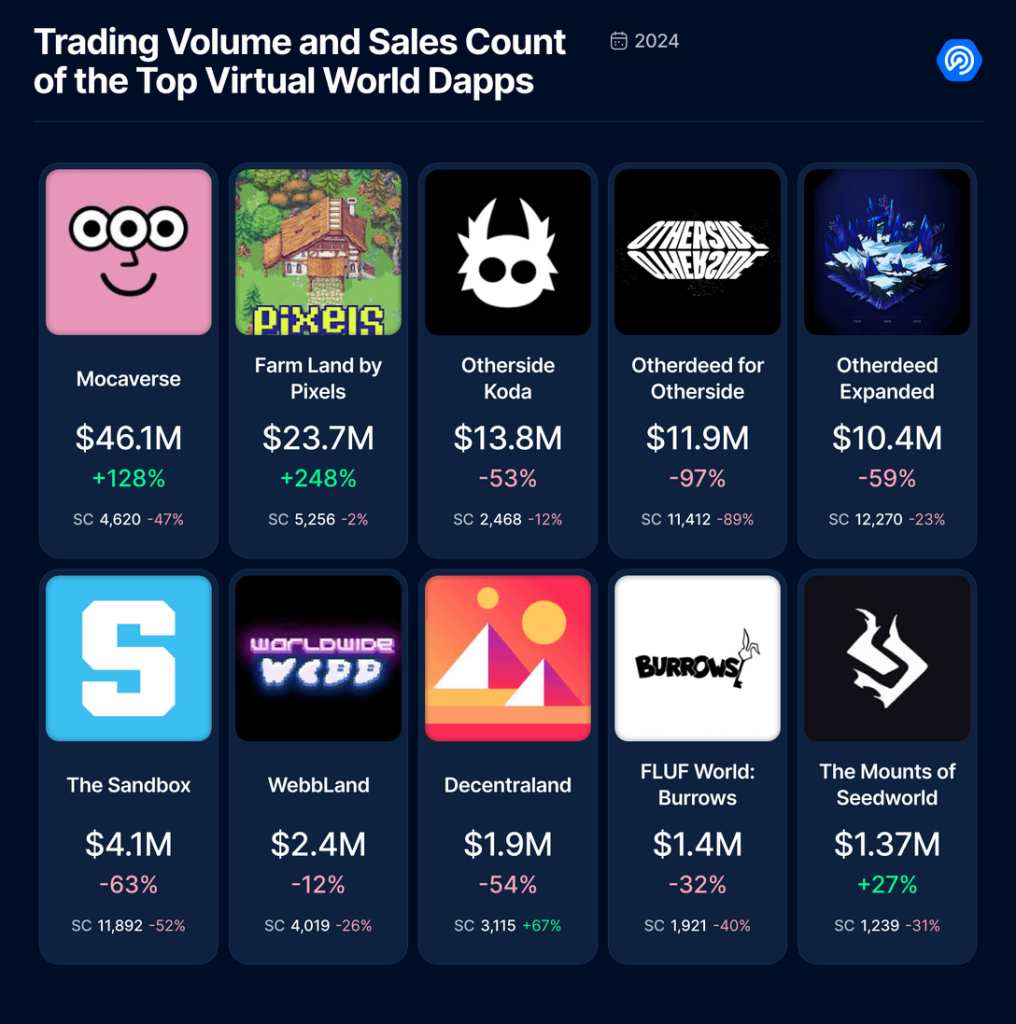Zuckerberg was wasted $46 billion? What happened to the Metaverse Track

Reprinted from panewslab
03/24/2025·1MAuthor: Jeffrey Gogo , Cryptonews
Compiled: Tim, PANews
Key Points
-
Four years since Mark Zuckerberg's full bet on the meta-universe, the concept has now been listed as one of the biggest failures in the tech world in recent years.
-
One of the main reasons for the decline of the metaverse is the rise of generative artificial intelligence.
-
Despite the overall downturn in the industry, some projects still maintain strong development momentum. Experts pointed out that this field is undergoing a process of eliminating false and reserving the truth, gradually squeezing out false participants.
When Mark Zuckerberg elaborates on his vision for the metaverse in October 2021, digital utopian ideas that can be connected and interact in an immersive virtual environment sounds like it can be realized.
The billionaire founder believes the metacosmic marker is the next frontier of the Internet, and the company immediately began to invest billions in developing the technology needed to realize its metacosmic strategic vision.
Zuckerberg even renamed Facebook to Meta to reflect its new strategic ambitions to build the meta-universe. The metaverse is a virtual world built on virtual reality and augmented reality technologies, in which people can interact, work and create.
Given the huge amount of money Meta (which has invested about $46 billion in the meta-universe since 2021) and other competitors invested in the concept, it is hard to imagine why the meta-universe failed to take off successfully.
Once upon a time, artists including Sir Elton John and Travis Scott held concerts in the metaverse, and at the same time, people began to visit cities and art exhibitions in virtual environments.
However, four years after Meta CEO Zuckerberg's strategic transformation, the metaverse has become one of the most significant failures in the technology industry in recent years. The billions of dollars that once poured into the field have receded and public attention has also declined due to failure to fulfill its grand promises.
According to DappRadar data, the transaction volume and sales volume of the Metauniverse NFT project in 2024 fell to the lowest level since 2020, with transaction volume falling by 80% year-on-year, and sales volume plummeted 71% from the same period last year.

Source: DappRadar
AI "intercepts" the meta universe
According to experts, one of the main reasons for the decline of the metaverse is the rise of generative artificial intelligence (AI) chatbots such as OpenAI's ChatGPT and Google's Gemini.
"Generating AI enables instant and scalable business impact," Irina Karagyaur, co-founder and CEO of BQ9 Ecosystem Growth Agency, told Cryptonews.
Karagyaur is also an expert member of the Metauniverse Focus Group of the United Nations International Telecommunication Union (ITU), and she further pointed out:
Unlike the metaverse, artificial intelligence tools represented by ChatGPT, MidJourney, and DALL·E show immediate availability. Enterprise users and consumers have turned to the AI field due to automation process optimization and content generation efficiency improvement. The strategic shift in venture capital is particularly significant: capital is pouring into AI startups, while Metaverse-related projects are downgraded.
Herman Narula, CEO of Improbable, a meta-universe venture incubator, revealed to Cryptonews that artificial intelligence has played a considerable role in the decline of the meta-universe.
He said that AI technology has seized the focus of industry attention with the attitude of "next generation of disruptive technologies", resulting in a large-scale shift in the attention of the metaverse. In addition, this evolution involves other multiple factors.
“The term ‘metauniverse’ has attracted criticism for being linked to speculative cryptocurrency speculation, which have raised a lot of money, sold a lot of assets and made a series of promises that were ultimately unfulfilled.” Narula further pointed out:
“More importantly, early versions of the metaverse or prototype metaverses failed to meet expectations, and the closed and confined environment they provide greatly limits the user’s activity.”
After Meta (formerly Facebook) announced its entry into the meta-universe field, prices of related tokens, such as Decentraland (MANA), The Sandbox (SAND) and Axie Infinity (AXS), have seen a sharp rise.
Now, as the outside world's doubts about the future of Meta's meta-universe dream continue to ferment, the prices of related tokens plummeted amid the extremely sluggish number of daily active users.
Since hitting an all-time high in November 2021, the prices of SAND, MANA and AXS tokens have all plummeted by more than 95% from their peak. Among them, MANA once hit a historical high of US$6.96, SAND broke through US$5.20, and Axie Infinity token AXS once reached a sky-high price of about US$153.
However, a new on-chain data analysis from cryptocurrency research firm Glassnode shows that despite the volatile price volatility, "conviction-firm holders are steadily increasing their positions" in these three projects.
For example, Glassnode noted that MANA tokens form a significant concentration of chips around $0.60, reflecting the increase in market buying activity after the price drop. Similar chip accumulation modes also appear on SAND and AXS tokens.
"The continued accumulation of chips in major meta-universe tokens shows that many investors believe these projects are undervalued investment opportunities rather than failures," Glassnode believes.

According to CoinGecko data, as of press time, Decentraland platform native token MANA is now at US$0.27, down 2% during the day; The Sandbox platform token SAND falls 3.2% to US$0.28; Axie Infinity ecological token AXS fell more than 1%, temporarily reaching US$3.43.
Hardware becomes a "stumbling block" for implementation
Charu Sethi is an expert in the Web3 field and also the chief ambassador of Polkadot. In an interview with Cryptonews, Sethi said the Metaverse's business model was not fully mature when its concept became popular.
“Big brands launched NFTs and expensive virtual land projects at the time, but few users received sustained value,” she said. “For example, Decentraland and The Sandbox have been hovering below 5,000 daily users despite attracting millions of dollars in investment.”
Sethi also mentioned that the high prices of high-end virtual reality (VR) and augmented reality (AR) headsets and the "complex login process" further hinder the popularity of the metaverse.
Hardware devices are the key to enhancing the metaverse experience.
“So, capital and attention have shifted toward AI that delivers instant ROI,” she stressed. “For many companies, the rapid gains from AI dwarf the metaverse.”
As part of the Meta Universe Competition, Meta and Apple have launched VR headsets that allow users to immerse themselves in virtual spaces.
With these hardware devices, people can do all kinds of things in the metaverse through digital clones: games, social interactions, and even virtual office work. But these headsets are a bit expensive.
Apple's Vision Pro costs $3,500, and the Meta Quest 3 headset starts at $500. By contrast, AI tools like ChatGPT offer limited free services, and its $20/month premium membership version offers unlimited services without requiring users to purchase additional hardware devices.
Karagyaur, a meta-universe expert at the International Telecommunications Union (ITU), pointed out that the growth of the VR headset market has stagnated because Apple's Vision Pro, Meta Quest 3 and other devices "can only attract niche user groups and fail to open up the mass consumer market."
"Due to the failure to explore sustainable profit models, it is becoming increasingly difficult to justify the high investment and high risks in the meta-universe field."
Kim Currier, marketing director at the Decentraland Foundation, pointed out that the metaverse is not only a narrative of VR/AR hardware. "It creates a virtual space where humans can socialize, explore and create new things together," she particularly emphasizes.
Currier continued: Although Apple's Vision Pro and Meta Quest 3 "have set off a wave of innovation, the consumer side will still face the fact that most users are unrealistic about wearing headsets all-weather."
Currier, who is more interested in how artificial intelligence and the metaverse can bring real benefits to people, she calls these people “the core users of the metaverse.”
The Decentraland executive did not view the rise of generative artificial intelligence as "competition" but as "opportunity", saying:
“AI tools can accelerate the construction of virtual worlds, help people track dynamics in real time in virtual spaces, and make the experience of the metaverse more dynamic and personalized. It can be said that AI will help the virtual world evolve in a way that we are just beginning to explore.”
The industry is reshuffle
Currier, marketing director of the Decentraland Foundation, attributed the reasons for the decline of the metacosmic to: "Previous market bubbles caused by overdrafts; difficult to break through technology bottlenecks; structural changes in the technology industry."
Currier told Cryptonews that the current phased cold of the metaverse is actually a reconstruction of industry value , and this reshuffle is screening loyal builders:
"Like all bear market cycles, this is a major industry reshuffle - leaving room for loyal builders through market clearance, who will understand the boundaries of the metaverse and focus on the products that users really need."
Karagyaur, CEO of BQ9 Eco-Institution, stressed that the metaverse is not dying, but is undergoing a technological paradigm transformation - the field is "evolving vertical application clusters that empower AI based on public needs."
“While the initial hype may have faded, what remains is something more profound: the transition from a virtual world controlled by enterprises to anthropocentric community-driven ecosystem,” she elaborated, adding:
“While industrial applications, such as Siemens and NVIDIA’s digital twins, are still growing, the real vitality has turned to platforms like Roblox, Fortnite and Immortal World. Here, it is shaping the experience dominated by the user community rather than the enterprise. These platforms do not sell escapist solutions, but empower people to create, build connections and collaborate.”
Polkadot blockchain project representative Sethi cited industry data and pointed out that the game platform Roblox exceeded 80 million daily active users in 2024, and this year it hit a peak of 4 million simultaneous online users , continuing to lead the meta-universe user stickiness indicator.
Epic Games' phenomenon-level game "Fortnite" maintains strong growth momentum
- according to the latest operating data, its single-game user reach has steadily exceeded 10 million , and continues to consolidate its position as the leading platform for the Metaverse social entertainment.
Polkadot blockchain analyst Sethi deeply deconstructs the ecological empowerment model of Fortnite - through a brand strategy that links virtually and real with luxury brand Balenciaga, the phenomenal film and television IP "Star Wars", etc., the platform successfully builds a commercial closed loop with an average of one million users per day , confirming the continuous value creativity of the Metaverse IP operation.
Hope in the dark
Experts say Zuckerberg's gamble on the metaverse has turned into a complete disaster. In 2024, Reality Labs, a division of Meta's development of meta-universe products, reported a record operating loss of $17.7 billion.
According to Meta's official financial report, Reality Labs' cumulative losses in the past six years are approaching $70 billion. Although Zuckerberg's meta-cosmic blueprint has been shattered, there are still several projects within the ecosystem that show a trend of counter-trend growth.
Blockchain data analysis agency DappRadar released the "2024 Annual Game Industry Report", focusing on promoting the two most influential meta-universe projects of this year: the digital identity protocol Mocaverse and the chain game platform Pixels. The two achieve dual breakthroughs in user scale and commercial value through differentiated ecological construction strategies.

Source: DappRadar
The Mocaverse project created by Animoca Brands has launched MOCA tokens and on-chain decentralized identity called Moca ID, which attracted 1.79 million users to register in a short period of time and successfully integrated with 160 Web3 applications.
The report notes that the project has received $20 million in financing to expand its ecosystem and launches Realm Network, which aims to "promote interoperability in gaming, music and education."
Pixels was first launched in 2022. Last year, the browser-based farm-themed multiplayer online game "gained huge attention" with its daily active users exceeding the one million mark.
The Pixels project has moved from Polygon to Ronin Network and integrates its assets called "Farm Land NFT" into Mavis Marketplace.
DappRadar also mentioned some important progress in Yuga Labs' Otherside Metaverse, The Sandbox and Decentraland. Among them, Decentraland launched a new version of the desktop client, which is said to have "improved running performance and optimized visual effects."
The report pointed out that the Decentraland platform's economic system with creators as its "significant feature". Creators can not only retain 97.5% of their sales, but also receive a royalty share of 2.5% when trading digital assets at secondary transactions - a record-high income distribution ratio in the industry.
Nevertheless, there are serious shortcomings in some aspects. According to DappRadar data:
"There is a lack of 'killer applications' that can drive mass popularity, and the focus of media attention has also declined, and companies that have previously invested heavily in the virtual world have also shifted their business focus."
The meta-universe is declining?
ITU expert Karagyaur said in an interview with Cryptonews that the success of the metaverse will "depend on integration, not isolation." She explained:
"It can only continue to grow where it can complement existing industries, not in areas where it is trying to replace them. The next stage of digital technology development will no longer aim at escapism, but rather work to improve reality itself."
Narula, founder and CEO of Improbable, who created the Yuga Labs meta-universe platform, pointed out that value-driven innovation will save the meta-universe. To transcend dazzling visual effects, users must have practical value.
"The meta-universe has always been a deeper and more rooted concept, and its roots lies in meeting people's basic needs for realizing themselves," he said.
"Although the 'exaggerated' Meta-type meta-universe has faded out, we are working hard to create a technology-oriented and practical version that is still firm," he said.
Narula also mentioned that teenagers and minors "spending a lot of time on gaming platforms such as Minecraft, Roblox and Fortnite to participate in increasingly complex virtual experiences, economic activities, and even engage in virtual work.



 jinse
jinse